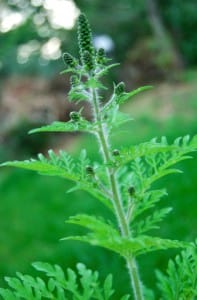An important study investigating safety and effectiveness of a treatment for ragweed allergy saw symptoms and medication use reduced by an average of 43 percent.
The treatment, known as SAIL (Sublingual Allergy Immunotherapy Liquid) involves liquid ragweed extracts being taken under the tongue daily, with the aim of desensitizing people to the weed, or at least significantly reducing their symptoms.
The 2014 study involved 429 ragweed-allergic participants in 26 sites across North America. Some received the treatment, while others received a placebo. In answer to questionnaires, those receiving the SAIL treatment had 43 percent lower scores on symptom and medication use compared to those in the placebo group.
The treatment falls under the umbrella of sublingual immunotherapy, or SLIT. However, the most successful SLIT products to date have been in tablet form. This study marks the first time a liquid SLIT treatment has reached the level of a phase 3 trial – the final phase before seeking FDA approval.
Sublingual immunotherapy, like conventional immunotherapy or allergy shots, aims to desensitize people to allergens by introducing tiny, then increasing amounts of the allergen to the body on a regular basis. Instead of injections, SLIT uses medicine placed under the tongue daily.
“Sublingual immunotherapy is an alternate form of treatment that is often administered to pollen allergic patients in Europe,” notes Dr. Peter Creticos, lead author of the study. “However, the few previously performed U.S. studies of liquid allergenic extracts were either early safety and preliminary dose-ranging studies or were unsuccessful. This study provides the first conclusive evidence that this form of treatment can be safely tolerated at effective doses.”
Side effects included local reactions as well as mild to moderate swelling and itching of the mouth and throat, hives and diarrhea. Encouragingly, there were no cases of anaphylaxis in the study.
Related Reading
Ragweed Allergy: Symptoms, Treatment and Avoidance






